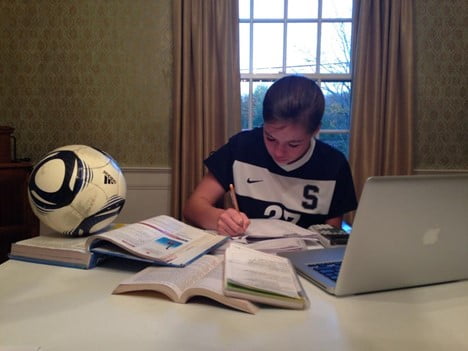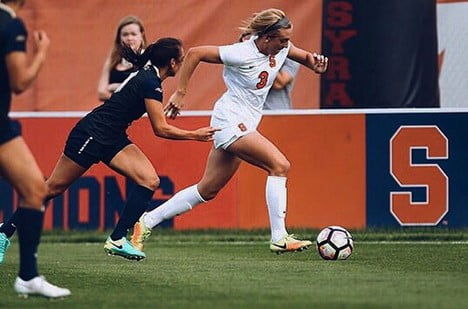Student-Athletes: Balancing Your Academics and Sporting Needs

Going to college is challenging, but going to college and playing a college sport can be twice as challenging. The most important thing to remember is that if you were already able to successfully juggle High School academics with SAT preparation and High School sport, then some of the of the same principles still apply in college.
If you are a student-athlete in college, it’s certain that your contribution to your team and performance is very important to you. While there are many rewarding opportunities associated with being a student-athlete, many continue to struggle in finding the appropriate balance between academics and athletics. College freshmen may have the hardest time adjusting to this balance as they’re already dealing with the pivotal transition from high school to college, but with the right attitude and planning, student-athletes can successfully achieve a proper balance between academics and athletics.
Always remember why you are doing what you are doing. Whether or not you intend to go pro in the sport you are playing, always remember that your academics come first. If your goal is to become a professional athlete, bear in mind that you must maintain a certain GPA to stay on the school team. Failing will jeopardize your pro player dreams, so you better prioritize your studies.

Here are a few tips to successfully balance athletics and academics as a college student-athlete:
Schedule Classes That Fit Your Athletic Schedule
If you know you typically have practice from 4:00pm – 6:00pm, don’t try to take a class that meets around that time of day unless you absolutely have to— it will just end up causing undue stress. Figure out the best times of day for your classes and do your best to fit them into those time slots.
Make sure professors know that you are a student-athlete and that although you put academics first, you may have athletic commitments (away game trips, etc.) that interfere with a class. Let them know your test schedule ahead of time so you can make a plan for any possible conflicts well in advance.
Also, communicate with coaches in the same way. Some courses require labs or out of class meetings that may conflict with a practice. Let coaches know ahead of time to see if there is a way to work it out. Along the same lines, make sure you have someone else in the class whom you can count on to provide notes or other work that you may miss due to an unavoidable conflict.
Dedicated Time each Day to Academics
You can’t control your athletic schedule and once you choose classes you can’t control the days/times that you are required to be there. However, you can control every minute of your “free” time.
Don’t go in with the mindset that you’ll “get it done later” because most of the time something else will come up that gets in the way. If you prioritize your school work ahead of time, i.e. 6:00pm – 8:00pm is devoted to academics, and you stick to that schedule, you will be amazed at how productive you can be.
Student-athletes at the college level are busy. While student-athletes competing at the NAIA, Division III and Division II levels may have a little bit more free time than Division I athletes, it still takes plenty of planning and hard work to balance athletics with academic and social commitments.
According to the NCAA, Division I athletes spend an average of 34 hours per week on academics on top of 36.5 hours per week on athletics.
Avoid burnout
Your body needs time to recover, especially when you’re still growing at a young age. College athletes do not spend all their free time in the gym weight lifting. They also spend a significant amount of time on injury prevention, increasing flexibility, nutrition planning and film review.
Being an athlete is not about taxing your body 100 percent of the time.
As much as you want to do it all, and well, all the time, realize that everyone needs a break from time to time. Considering you have to handle more responsibilities than the average college student as an athlete, it’s important to give yourself breaks in order to avoid burning out. Burning out will only make your responsibilities more burdensome in which the quality of your school and athletic performance will suffer, as a result.
Learn about yourself
For most college recruits, the end goal is getting a college education. After all, your chances of going pro in your sport are slim.
According to the NCAA, the chances of simply making it from high school to an NCAA roster are low for most sports, including major sports like men’s basketball (3.2%), women’s basketball (3.8%) and football (6.9%). Then, of the more than 480,000 NCAA student-athletes, fewer than 2% eventually go pro in their sport. That means you’ll definitely want to get a good education so you can later turn it into a good career. But it can also be difficult to pick a major in college and find what you’re best at or most interested in. That’s why it’s a good idea to start early and consider what you’d like to do in college and after your athletic career is over. Spend some time thinking about this and you may surprise even yourself with what you’ll learn.

Stay Motivated
Aside from the school’s and collegiate sports divisions’ incentives for maintaining good grades, try giving yourself personal incentives and goals to reach each semester to ensure you are satisfied with the amount of effort and progress you are making within both realms.
This will motivate you to stay on your team and reach that grade point average you’ve been aiming for since you began your college career. At the end of the day, your ability to stay motivated will test your dedication to sports and the will to improve, making the obstacles you face worth the reward. Just remember that you took on sports and school simultaneously for a reason!
The truth is, life can change your plans faster than you think. Your college degree is a good backup plan, no matter how good an athlete you are. Should anything go wrong, you can always fall back on the profession you chose. Balancing sports and academics can be difficult, but it’s a lot easier if you plan ahead. Fortunately, BRUSA Sports can help. You can start by signing up for a free recruiting evaluation – SIGN UP HERE

